Sunday Feb 22, 2026
Sunday Feb 22, 2026
Tuesday, 15 March 2022 03:42 - - {{hitsCtrl.values.hits}}
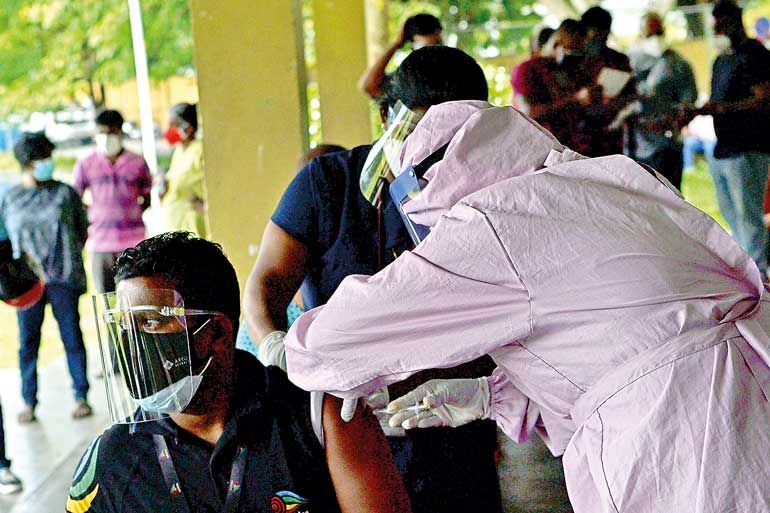
The Research Intelligence Unit (RIU) initiated a survey in 2021 to understand public experiences, views and concerns on COVID-19 and the vaccines. The ongoing survey currently has over 1,500 respondents, most of whom are based in Sri Lanka. Important findings include the staggeringly high levels of infections amongst the non-vaccinated vs the vaccinated, the sharp increase in cases post-vaccination and the public concerns on civil liberties. Herein we present an overview of the results and analysis.
The vaccinated
Of those that were interviewed in the survey, 88.2% had been vaccinated with Pfizer and Sinopharm being the most administered vaccines. Amongst those that were vaccinated, 58.3% had received their second vaccination doses with the same vaccine type and 0.4% were administered with a second vaccine that was different from the first vaccine (Refer Figure 1).
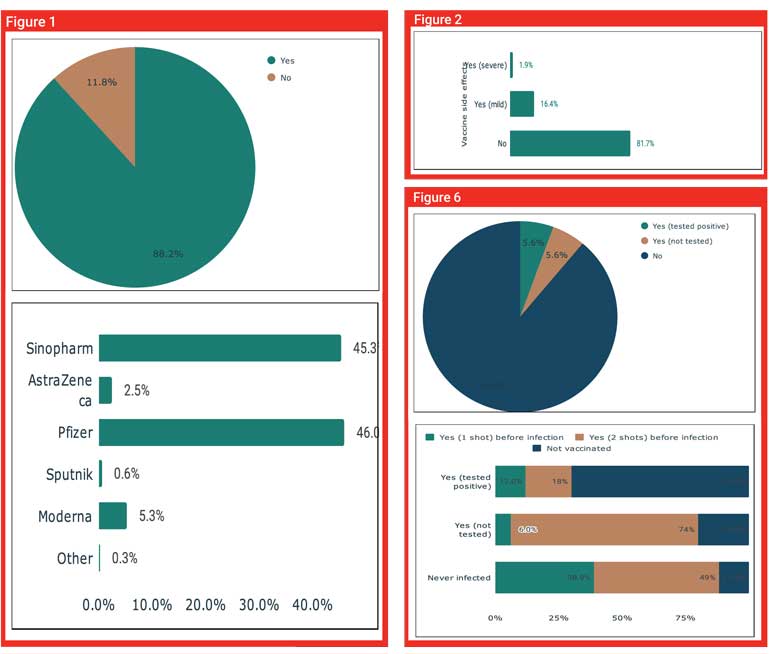
Side effects
The results show that 2% of all those that were vaccinated experienced severe side effects with body aches being the most common severe side effect, followed by fever. Gender had a negligible effect on the possibility of side effects from the vaccines, with results for both genders almost completely matching the overall results shown in Figure 2.
No one aged between 12-21 years of age reported severe side effects and 94.5% of those in this age group experienced no side effects at all. Similarly, no one over 75 years of age reported severe side effects, although 22.2% in this age group did experience mild side effects (Refer Figure 3).
When assessing side effects vs. the vaccine types, data shows that the Pfizer vaccine had the highest percentage (87%) of recipients who experienced no side effects. The Sinopharm vaccine had a similar result with 84% of recipients experiencing no side effects. Contrastingly, amongst Moderna vaccine recipients, only 27% experienced no side effects and 7.3% experienced severe side effects – the highest amongst all vaccines (Refer Figure 4).

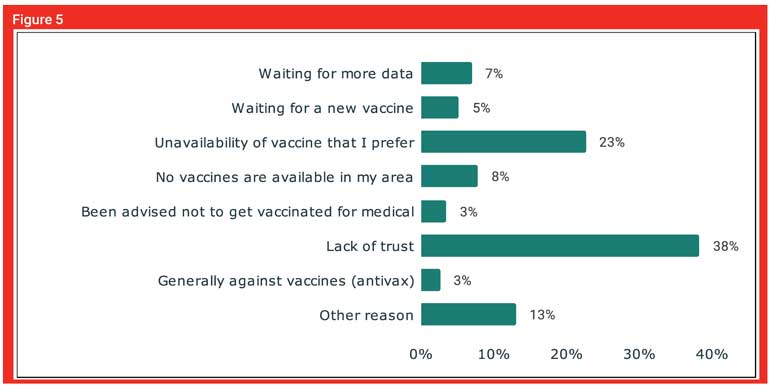
The unvaccinated
Around 11.8% of all the respondents surveyed, had not received any vaccine and a majority of these individuals had not contracted COVID-19 at the time of the interviews. “Lack of trust” appeared to be the main reason why people chose to not get vaccinated and only 3% of the unvaccinated respondents were anti-vax (generally against vaccines). Some 23% indicated that they were holding out on getting the vaccine as their preferred vaccine option was unavailable. Amongst these particular respondents, a vast majority (76.5%) selected Pfizer as their preference (Refer Figure 5).
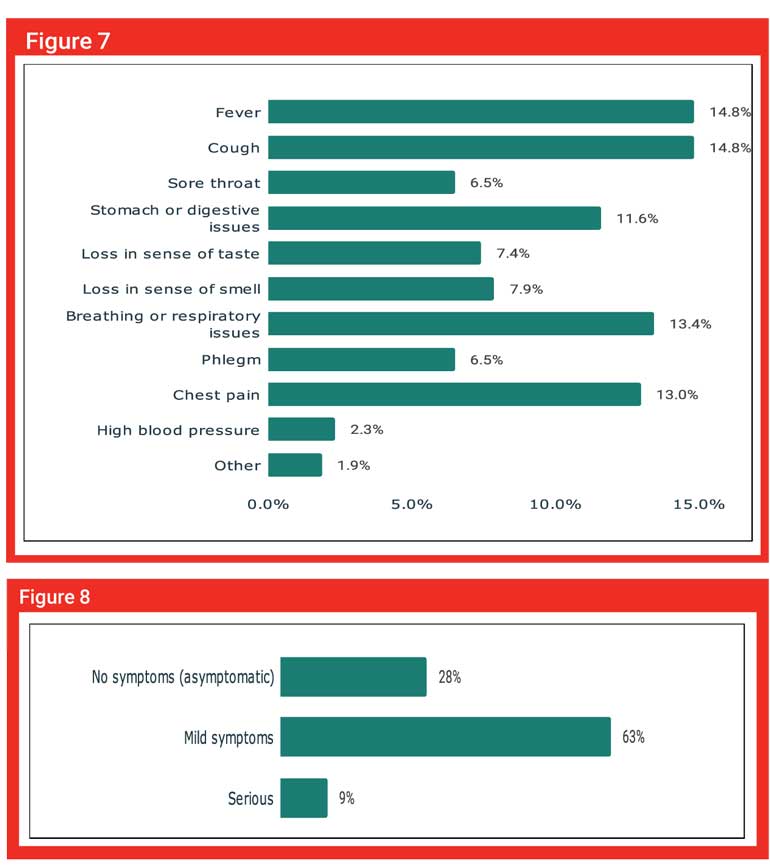
Vaccinated vs unvaccinated
Some 88.9% of all respondents surveyed indicated that they had not been infected with COVID-19. 5.6% tested positive and a majority (70%) of these respondents were not vaccinated at the time. On the contrary, of the other 5.6% that self-diagnosed themselves with COVID-19 without tests, 74% claimed to have received two doses of the vaccine before infection (Refer Figure 6). Although the latter statement cannot strongly question the vaccine’s effectiveness due to respondents not being tested, it is still alarming that 18% of those who tested positive, had been double vaccinated at the time.
The reasons for post-vaccination infections can be manifold. According to the Ministry of Health Sri Lanka, it typically takes at least two weeks after vaccination for the body to build adequate protection (immunity) against the virus that causes COVID-19. This statement is echoed by other global authorities such as the Centres for Disease Control and Prevention (CDC) and the Australian Department of Health. Therefore, a reason for post-vaccination infections may be insufficient safety protocols being imposed at vaccination centres, or respondents not taking adequate safety measures post-vaccination.
There have been instances at vaccination centres, where large crowds hoping to receive the vaccine, were asked to queue or be seated without the precautionary one-metre distance separation or other measures being strictly enforced. This, coupled with the inadequate post-vaccination safety measures of vaccine recipients, could have majorly contributed to those that have claimed to have been infected despite receiving the vaccine.
An alternative view is given with reference to the phenomenon of ‘shedding’. Some leading health experts and commentators have noted that immediately after receiving the shot, the vaccinated, who have now been given COVID via the shot, then proceed to infect people around them as well as feel the COVID symptoms themselves. This is supported by data from around the world that shows a correlation between national vaccination drives and hikes in infections.
COVID-19 patients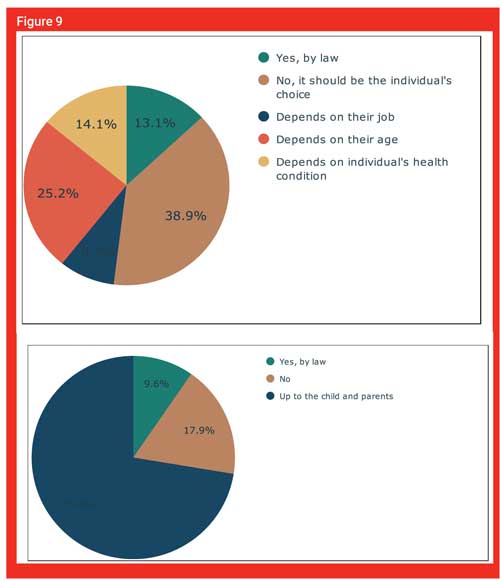
Fever and cough were the most common symptoms for those that were infected with COVID-19. Other symptoms were difficulty in breathing, respiratory issues, chest pains, stomach and digestive issues (Refer Figure 7).
A total of 9% of those that were infected with COVID-19 experienced serious symptoms. Amongst these particular individuals, breathing/respiratory issues were the most common symptom (Refer Figure 8).
General public views on the vaccine
In early November 2021, it was reported that Sri Lankan Health Minister Keheliya Rambukwella was considering COVID-19 vaccine cards to be made mandatory for people to visit public places in the country. This would be a controversial step if actioned, considering only 13.1% of the public believe that vaccination should be made mandatory and only 9.6% believe that it should be mandatory for children (Refer Figure 9).
Since the Research Intelligence Unit initiated this independent and self-funded study in Sri Lanka in 2021, we have witnessed the spread of the Omicron variant in all parts of the globe. With a higher level of transmissibility combined with less severe symptoms, most governments around the world have accepted that ‘herd immunity’ can now be achieved. This study has also highlighted the importance of safeguarding the civil liberties of people against forced vaccinations which are opposed by the vast majority of respondents. With our ongoing research, we hope to shed more light on this subject as an ongoing exercise.
(For more information on the full report or questions on this survey, please contact the Research Intelligence Unit at
[email protected].)